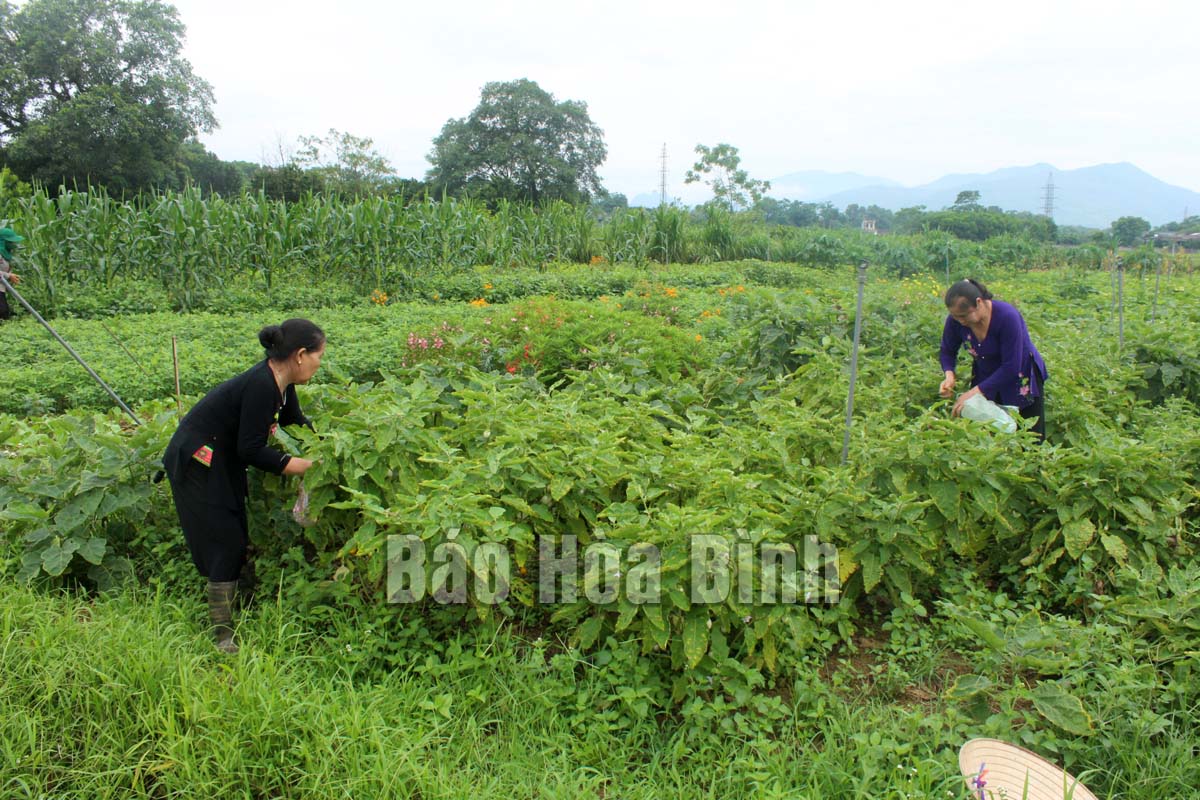
(HBO) – Although agricultural land makes up only 14.03 percent of Hoa Binh province’s total area, the farming sector plays an important role in ensuring food security, and generating jobs and income for up to 85.47 percent of rural residents, contributing to poverty reduction and socio-economic development.

Residents in Nhuan
Trach commune (Luong Son district) follow safe vegetable production models,
with connectivity chains, thus raising economic values of products.
Over the past years, Hoa Binh has recorded
significant achievements in the implementation of a project on agricultural
restructuring, and a programme on new-style rural area building. The provincial
Party Committee has issued thematic resolutions, while the provincial People’s
Committee has launched projects and policies with the aim of boosting
production in farming, husbandry and fishery, agricultural product consumption
and development of craft villages. Thanks to these efforts, such products as
Cao Phong and Lac Thuy oranges, Tan Lac red-flesh grapefruit, Lac Thuy and Lac
Son chicken, Luong Son goat, shrimp and fish in Da River, Luong Son organic
vegetables and Hoa Binh honey, among others, have been promoted strongly.
During the 2015-2020 period, the
agro-forestry-fishery sector grew by 3.45 percent, nearly doubling the national
average, making Hoa Binh among the top performers in the northern mountainous
area in this regard. Each hectare of farming land brings about 128.4 million
VND per year.
The province has established 311 agricultural
cooperatives and recognised 70 OCOP products. Its Cao Phong orange has received
a graphical identification, and 21 other products have been granted collective
trademarks.
Thanks to the support of local competent
agencies, more than 2,300 hectares have got VietGap and safe production
certificates, and 23 connectivity chains in agricultural production and
consumption have been rolled out. The province has over 1,000 preliminary
processing and preservation facilities, and nearly 500 processing
establishments, which have helped promote local products at supermarkets and
luxurious stores. A number of products like tea, banana, longan, fruits and
vegetables have been shipped abroad.
Hoa Binh was one of the first three localities
nationwide that have built and operated a product origin tracing portal, at
hb.check.net.vn, which is a step towards e-commerce. A total of 72 businesses
and cooperatives, with 400 products have joined the portal, and more than 8
million stamps of product origin have been affixed on products. In addition, by
2020, 76.3 hectares in the province had been granted nine codes.
Apart from the domestic market, a number of
enterprises and cooperatives have focused on market study to step up exports.
The provincial Party Committee has issued a
project on agricultural development and product consumption in combination with
new-style rural area building for 2021-2025. The project is expected to fulfill
the target of rapid, comprehensive development in agriculture and rural areas
in Hoa Binh, towards modernity and expansion of the production of plants and
animals that are of the province’s strength, thus forging exports and supplying
materials for the processing industry.
In Lac Thuy district, communes have been succeeded in promoting their One Commune-One Product (OCOP) products while others are still struggling to position their typical farming products in market. Some communes in the district still fail to have their products met OCOP programme’s requirements, while others have seen their certifications expired.
The inspectorate agency of Hoa Binh province has issued Official Dispatch No. 1090/TTr-PCTN to provincial departments, agencies, localities, business associations, enterprises, and investors regarding measures to improve informal component indexes of the Provincial Competitiveness Index (PCI).
Hoa Binh is taking concrete steps to improve its investment environment, with a strong focus on supporting businesses, settling obstacles for strategic investors, and creating opportunities for robust development in the coming years.
Under the blazing early summer sun, the construction site of Nhuan Trach Industrial Park (IP) in Luong Son district is abuzz with activities from dawn to dusk, a testament to the determination of the investor to meet their construction targets on schedule.



